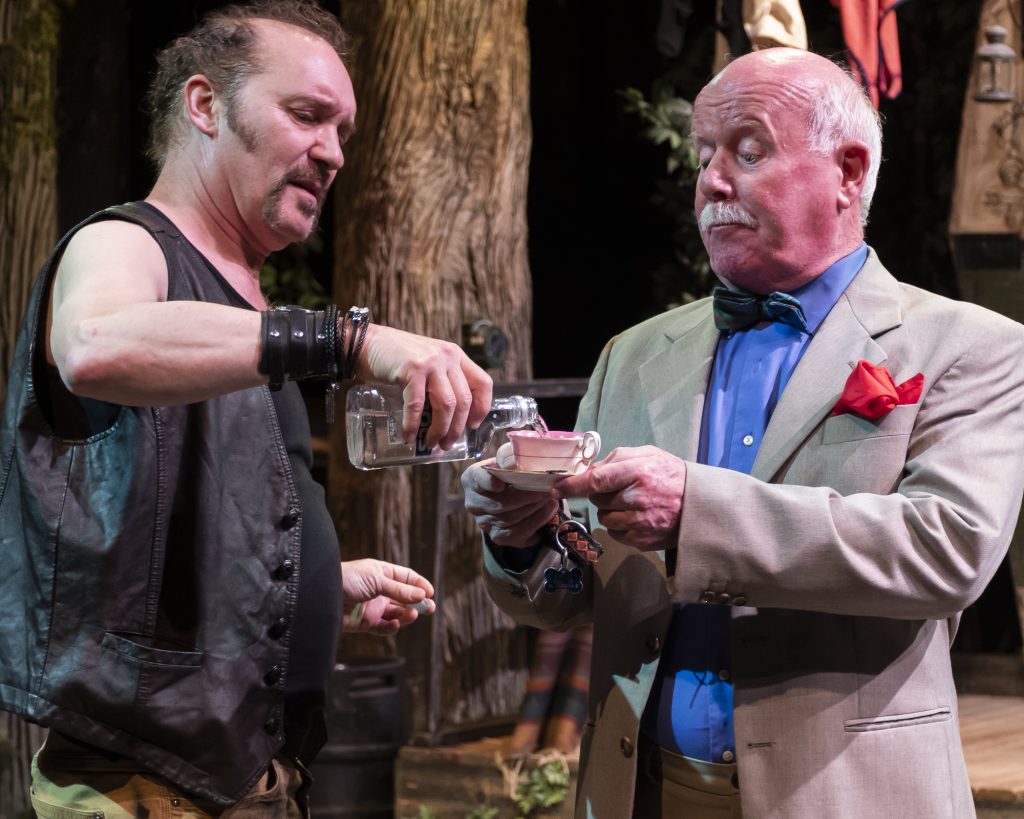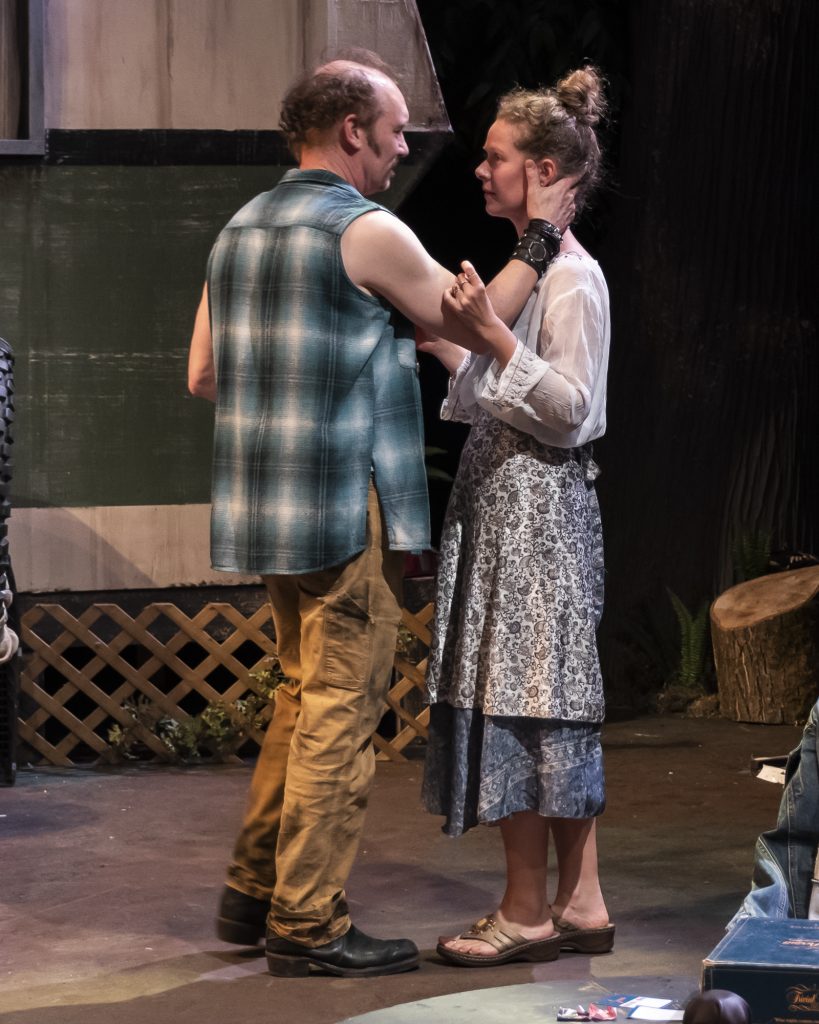
Credit: Nancy Caldwell
At Jericho Arts Centre until June 30, 2019
Tickets from $22 at 604-224-8007, www.unitedplayers.com or at the door
Posted June 8, 2019
Act 1 is mostly texture, not much plot. And it’s long at three hours. But see it because the payoff in Jez Butterworth’s Jerusalem, directed by Kathleen Duborg for United Players, is colossal and mythic in scale. The drumbeat will match beat for beat the pounding of your own heart.
Butterworth takes his title from the poem by William Blake, circa 1804. It appeared in Blake’s preface to Milton: A Poem in Two Books and was set to music – the anthemic Jerusalem – by Sir Hubert Parry in 1916. Sung now – perhaps mistakenly – as a paean to “Englands green and pleasant land”, Blake was already lamenting the England of the past: a peaceful, pastoral Christian land prior to the earth and soul-shattering Industrial Revolution.
Although Butterworth claims scholars have gone hog wild (he himself is a playwright and screenwriter who breeds and slaughters his own pigs in an isolated area of Somerset), he claims all the references are unintentional with the exception of the myth of St. George and the Dragon. Even there, he says, he’s “shaky on the myth.” I think he ‘doth protest’ too much. You can’t talk about Stonehenge, name a character Byron and another Phaedra, set the play on St. George’s Day, and include Morris dancers without sending those of us so inclined chasing after references. There are even shades of Evel Knievel in there.
The mythic-sized anti-hero is Johnny ‘Rooster’ Byron – a swaggering, foul-mouthed, drug-dealing scoundrel who lives in a battered trailer on the outskirts of a new housing development in Wiltshire, England. The neighbours and the constabulary want him and all his mess gone and on St. George’s Day, April 23, 2011, the police arrive with yet another order for him to clear out.

Credit: Nancy Caldwell
Actor Adam Henderson, in filthy trousers, a sleeveless leather vest, studded leather bracelets and scuffed leather boots, breathes life into this character in such a way you’re constantly conflicted: fed up with Rooster’s outrageous fabrications but grudgingly admiring of his ferocious rants against bureaucracy and conformity. Rooster Byron, from a long, long line of Byron men, is strikingly reminiscent of Christy Mahon in Synge’s Playboy of the Western World and the language of the play is, like that of many an Irish writer, colourful and lyrical – albeit it laced with ‘fuck’ and ‘cunt’ and more. Henderson never seems simply to walk but to stumble, swagger and stagger and never simply to sit but to lay about or slouch, one leg constantly jiggling. It is a stunning performance made even more remarkable in that Henderson persuades us away from thinking Rooster is totally repugnant into believing he’s defiantly heroic.
The unlikely hero attracts a motley crew of local young adults to his squalid surroundings (set design by R. Todd Parker) where he provides them with booze and dope and regales them with utterly unbelievable tales of derring-do. Not always taken in by the tall tales is Ginger (Josh Osborne) but even he eventually is silenced in the face of Rooster’s wildly theatrically-performed stories – one of which is that he was born with a semen-covered bullet in his teeth. Apparently, all the Byron babies are born with teeth. Osborne, as the wannabe deejay, is gangly and sweet and exhibits a little more brain activity than some of the others with the exception of Lee (Marc LeBlanc), who is leaving for Australia the next morning.
Woven throughout Jerusalem is Phaedra (Dayna Hoffmann), an ethereal, fairy-like creature whose existence we sometimes question although she is apparently real and a reluctant Queen of the May, hiding out from the celebrations as well as her abusive father.

Credit: Nancy Caldwell
Making a late-in-the-play appearance is Dawn (Martha Ansfield-Scrase), Rooster’s long-suffering wife, still obviously charmed by him but moving on with their young son Marky (Ash Dexter) and a new man. (Sharing the role of Marky during the run are Thomas Taplin and Isla McGlashan Green.) In all the rowdy grime and roustabout chaos, Dawn is the sole calm, clear-headed adult who has, more or less, freed herself from the all the mess of Rooster’s life. Quiet little Marky has a gentle curiosity and affection for his wayward father that his mother appears to foster.
Under Kathleen Duborg’s direction, this is a powerful production (with a cast of fifteen mostly non-professionals) that would be at home on any professional stage.
The play’s inexorable drift to the dark side is leavened with raw humour – some of which is not all that funny unless you find stoned, alcohol-fuelled young people hilarious – and glorious, soaring, poetic language. In spite of excellent pacing, Jerusalem feels long with two, ten-minute intervals; some scenes feel pointless in moving the plot along and the play could easily lose fifteen to twenty minutes.
But, oh, the curtain comes down on a stunning scene. It tears at your heart and curdles your blood and makes you – like Rooster – grieve for a past that probably never was. And a future that will never be. Rage, rage.
Don’t miss this one.

